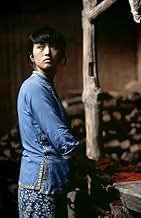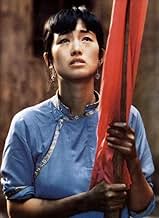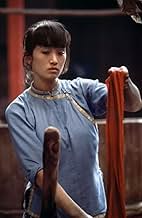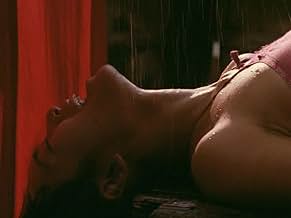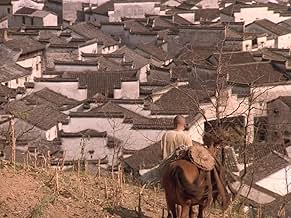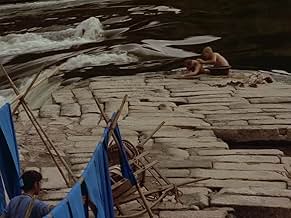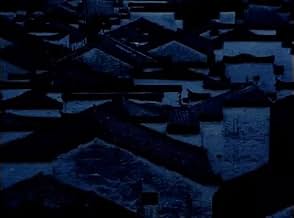IMDb रेटिंग
7.6/10
9.4 हज़ार
आपकी रेटिंग
अपनी भाषा में प्लॉट जोड़ेंIn rural China, the young bride of a tyrannical owner of a silk-dyeing business finds temporary solace in the arms of her husband's nephew, but problems arise when she becomes pregnant.In rural China, the young bride of a tyrannical owner of a silk-dyeing business finds temporary solace in the arms of her husband's nephew, but problems arise when she becomes pregnant.In rural China, the young bride of a tyrannical owner of a silk-dyeing business finds temporary solace in the arms of her husband's nephew, but problems arise when she becomes pregnant.
- 1 ऑस्कर के लिए नामांकित
- 8 जीत और कुल 6 नामांकन
फ़ीचर्ड समीक्षाएं
A good movie makes you feel and this one does that ...the Technicolor is amazing and the story makes you pause and reflect. The story is pretty old boy meet girl and girl is unavailable. No new twists, she is married and her husband is older and cruel (of course). Additionally he is hell bent on making a son and has "gone" through a couple of wives already. However, as this film develops the viewer feels compassion for the the would be lovers. There are places, one of the more pivotal point in the film is where the husband has an accident and how the protagonist reacts. Basically when I finished watching the film I felt quiet-not peaceful just a bit disturbed. The images from the movie continued to play in my head and it just made me wonder about the levels of cruelty people suffer through and place upon others. ten lines is a lot to write...help me end this now, I am starting to wonder if I should have just left it at voting...
"Ju Dou" was made before "Raise the red lantern" (1991), the breakthrough movie of Zhang Yimou in the Netherlands, but released in the aftermath of the success of the last mentioned movie. There are similarities between the two films, but also big differences.
The similarities are that in both films a young woman is "bought" by an old wealthy man. In both films tensions arises when a male baby does not come soon.
In "Raise the red lantern" the older and earlier women of the rich man are still there, and the emphasis is on the jealousy and sneaky bullying of the women among themselves. In "Ju Dou" the former women of the rich men are already dead. The emphasis is on the hatred of the woman against her old husband and her extramarital affair with an adopted nephew of her own age.
With respect to this extramarital affair the openness with which sexuality is portrayed is remarkable for a Chinese film. There are even glimpses of exhibitionism. First the woman discovers that the nephew is peeping on her while bathing. Shocked at first it doesn't take long before she puts up a show to get the nephew excited. Later, when the old man is paralysed and immobile, the woman and the nephew make love to each other in a way that is clearly audible (and deliberately so) for the old man.
The main difference between "Ju Dou" and "Raise the red lantern" is however the use of color. Mostly grey in "Raise the red lantern", because the emotions (jealousy and sneaky bullying) are mostly subcutaneous. A feast of bright colors (the film is situated in a wool dyeing factory) in "Ju Dou" because the emotions (both the hatred for the old man as the passion for the nephew) are all consuming.
The similarities are that in both films a young woman is "bought" by an old wealthy man. In both films tensions arises when a male baby does not come soon.
In "Raise the red lantern" the older and earlier women of the rich man are still there, and the emphasis is on the jealousy and sneaky bullying of the women among themselves. In "Ju Dou" the former women of the rich men are already dead. The emphasis is on the hatred of the woman against her old husband and her extramarital affair with an adopted nephew of her own age.
With respect to this extramarital affair the openness with which sexuality is portrayed is remarkable for a Chinese film. There are even glimpses of exhibitionism. First the woman discovers that the nephew is peeping on her while bathing. Shocked at first it doesn't take long before she puts up a show to get the nephew excited. Later, when the old man is paralysed and immobile, the woman and the nephew make love to each other in a way that is clearly audible (and deliberately so) for the old man.
The main difference between "Ju Dou" and "Raise the red lantern" is however the use of color. Mostly grey in "Raise the red lantern", because the emotions (jealousy and sneaky bullying) are mostly subcutaneous. A feast of bright colors (the film is situated in a wool dyeing factory) in "Ju Dou" because the emotions (both the hatred for the old man as the passion for the nephew) are all consuming.
Mesmerizing melodrama set in 1920's China about a young woman who is forced to wed an abusive dye mill owner, who tortures her like an animal for not giving him a son, but more importantly, an heir. She decides to indulge in an affair with the nephew of her husband. Enthralling study of passion, sensation and burning for revenge brought to life in an extraordinary fashion which earned the film an Oscar nomination for the Best Foreign Language Film of 1990.
I have become a huge fan of Gong Li and have now purchased five films that she has appeared in. Ju Dou is by far her sexiest and most daring performance. She plays the lead character in the film named Ju Dou. She is a poor woman who is purchased by an old, impotent, and extremely cruel and abusive man who owns a Dye Factory. His name is Yang Jinshan. He wants to have an heir to succeed him but is having trouble getting his battered bride to conceive. At this juncture, his nephew, named Yang Tianqing, who is a mild mannered pervert who likes to be voyeuristic and watch his Uncle's new bride wash herself. Before he knows it, as the uncle is out on a trip, Ju Dou seduces him in one of the most erotic seduction scenes of all time. This is done in a very classy way, there is no nudity, but what is implied is quite obvious. In the aftermath of these proceedings, Ju Dou becomes pregnant and informs her "jackass" of a husband that she is going to give him a son. He is quite pleased and they end up naming the son, Yang Tianbi. Eventually the husband is crippled in an accident, and is later killed in an accident involving his son. For some odd reason, the son is as evil as can be and hates his mother and real Dad with a passion and proceeds with a plot to kill them. 2/3 of this movie is great. The last third in my opinion is that it is stupid. It is kind of like they tried to make Damien, The Omen, Part 4. The cinematography is excellent, but the last third of the movie was poorly done in my opinion. Like I said, this was Gong Li's sexiest role. She really has a way to express herself to the camera. However, the movie falls short of the mark.
A very well done story about the illicit relationship between a man and his "aunt" in 1920's China that results in disaster for all concerned. I've seen Gong Li in a couple of movies recently, and it's clear that she is both beautiful and talented. Here she plays the title character of Ju Dou, a young woman forced into marriage to Yang Jinshan, the brutal and sadistic owner of a dye mill, who beats and tortures her, and also wants her to bear him a son and heir. The mill is also home to Yang Tianqing, Jinshan's adopted nephew. Ju Dou and Tianqing fall in love with each other, and have a child, who is assumed to be Jinshan's. The result is tragedy all around eventually.
The story is both unpleasant and yet interesting. Few of the characters (with the exception of Ju Dou) really connected with me. Ju Dou, on the other hand, becomes the object of sympathy right from the start. Her life is horrible, and even the relationship with Tianqing (a gentle and loving one for the most part) ultimately strikes me as unsatisfying, because frankly Tianqing is a wimp. The character (well portrayed by Li Baotian) comes across as childish and immature and afraid the whole way through. In a way, the most powerful (and frightening in many ways) character was the adolescent Tianbai, Ju Dou's son. He only appears in the last third of the movie or so, but he comes across as completely hateful toward both his mother and Tianqing and totally unemotional. It all leads up to a tragic (and yet appropriate) ending.
One thing I really enjoyed in this movie was the depiction of the rituals around Jinshan's funeral procession. That was quite fascinating. Overall, this was an unpleasant movie with many unpleasant or at least unlikable characters, but still quite interesting. 7/10
The story is both unpleasant and yet interesting. Few of the characters (with the exception of Ju Dou) really connected with me. Ju Dou, on the other hand, becomes the object of sympathy right from the start. Her life is horrible, and even the relationship with Tianqing (a gentle and loving one for the most part) ultimately strikes me as unsatisfying, because frankly Tianqing is a wimp. The character (well portrayed by Li Baotian) comes across as childish and immature and afraid the whole way through. In a way, the most powerful (and frightening in many ways) character was the adolescent Tianbai, Ju Dou's son. He only appears in the last third of the movie or so, but he comes across as completely hateful toward both his mother and Tianqing and totally unemotional. It all leads up to a tragic (and yet appropriate) ending.
One thing I really enjoyed in this movie was the depiction of the rituals around Jinshan's funeral procession. That was quite fascinating. Overall, this was an unpleasant movie with many unpleasant or at least unlikable characters, but still quite interesting. 7/10
क्या आपको पता है
- ट्रिवियाIn the original novel Tianqing is the biological nephew of Jinshan and the story itself is about incest by affinity. The makers of the film version decided not to use the incest angle, so in the film Tianqing and Jinshan are not biologically related.
टॉप पसंद
रेटिंग देने के लिए साइन-इन करें और वैयक्तिकृत सुझावों के लिए वॉचलिस्ट करें
- How long is Ju Dou?Alexa द्वारा संचालित
विवरण
बॉक्स ऑफ़िस
- US और कनाडा में सकल
- $19,86,433
- US और कनाडा में पहले सप्ताह में कुल कमाई
- $10,300
- 10 मार्च 1991
- दुनिया भर में सकल
- $19,86,433
इस पेज में योगदान दें
किसी बदलाव का सुझाव दें या अनुपलब्ध कॉन्टेंट जोड़ें



